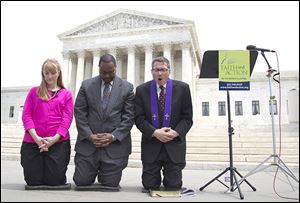
U.S. SUPREME COURT
Prayers OK at meetings, justices rule
Decision covers remarks at town council sessions
5/6/2014
Rev. Rob Schenck, of Faith and Action, right, prays in front of the Supreme Court with Raymond Moore, and Patty Bills, both also of Faith and Action.
WASHINGTON — A divided Supreme Court on Monday upheld prayer at the start of town council meetings, declaring them in line with long national traditions.
The content of the prayers is not significant as long as they do not denigrate non-Christians or try to win converts, the court said in a 5-4 decision backed by its conservative majority.
The outcome relied heavily on a 1983 decision in which the court upheld an opening prayer in the Nebraska Legislature and said prayer is part of the nation’s fabric, not a violation of the First Amendment’s guarantee of freedom of religion.
Writing for the court on Monday, Justice Anthony Kennedy said that forcing clergy to scrub the prayers of references to Jesus Christ and other sectarian religious figures would turn officials into censors.
Instead, Justice Kennedy wrote, the prayers should be seen as ceremonial and in keeping with the nation’s traditions.
“The inclusion of a brief, ceremonial prayer as part of a larger exercise in civic recognition suggests that its purpose and effect are to acknowledge religious leaders and the institutions they represent, rather than to exclude or coerce nonbelievers,” he wrote.
Local municipal boards, he wrote, can invite clergy and other citizens to offer prayers before meetings, even if most or all of those prayers end up reflecting just one religion.
The court ruled, 5-4, on Monday that the town council of Greece, N.Y., was within its constitutional rights to begin its meetings with prayers, even though it went for many years having invited only Christians to lead the prayers.
Prayer-givers had invoked specific Christian doctrines, invited all to bow their heads or stand with them in prayer, and used terms such as “we” and “our brother the Lord Jesus Christ.”
Such circumstances, a lower appeals court had ruled, amounted to a “steady drumbeat” of endorsing Christianity.
But Justice Kennedy said Greece made reasonable efforts to invite clergy and others to pray, consulting a Chamber of Commerce directory that only had church listings in the predominantly Christian community.
The goal of the prayer, Justice Kennedy said, is to set a tone of gravity before a board does public business — and it’s OK to get doctrinally specific, just not to go negative on others.
“Prayer that reflects beliefs specific to only some creeds can still serve to solemnize the occasion, so long as the practice over time is not exploited to proselytize or advance any one, or to disparage any other, faith or belief,” Justice Kennedy wrote.
While the Supreme Court had previously upheld prayers before legislative sessions, there was a dispute over what types of prayers were acceptable, said senior scholar Charles Haynes of the First Amendment Center, a national group monitoring religious freedom.
“There are going to be people deeply unhappy with this, but the good news is we now at least know some of the ground rules,” Mr. Haynes said.
Justice Elena Kagan wrote the dissenting opinion.
“I respectfully dissent from the court’s opinion because I think the town of Greece’s prayer practices violate that norm of religious equality — the breathtakingly generous constitutional idea that our public institutions belong no less to the Buddhist or Hindu than to the Methodist or Episcopalian.”
Justice Kagan wrote that the case differs significantly from the 1983 decision because “Greece’s town meetings involve participation by ordinary citizens, and the invocations given — directly to those citizens — were predominantly sectarian in content.”
Justice Kennedy himself was the author of an opinion in 1992 that held that a Christian prayer delivered at a high school graduation did violate the Constitution.
The justice said Monday that there are differences between the two situations, including the age of the audience and attendees at the council meeting may step out of the room if they do not like the prayer.
In Monday’s dissent, Justice Kagan wrote that the council meeting prayers are unlike those said to open sessions of Congress and state legislatures, where the elected officials are the intended audience.
In Greece, “the prayers there are directed squarely at the citizens,” she said.
She also noted what she described as the meetings’ intimate setting, with 10 or so people sitting in front of the town’s elected and top appointed officials. Children and teenagers are likely to be present, she said.
Justice Kennedy and his four colleagues in the majority all are Catholic. They are: Chief Justice John Roberts, and Justices Samuel Alito, Antonin Scalia, and Clarence Thomas.
Justice Kagan was joined by Justices Stephen Breyer, Ruth Bader Ginsburg, and Sonia Sotomayor. Of the four, three are Jewish and Justice Sotomayor is Catholic.
Senior counsel David Cortman of the Alliance Defense Freedom, which represented the town of Greece, applauded the court for affirming “that Americans are free to pray.”
Ayesha Khan, legal director for Americans United for Separation of Church and State, said the court disregarded the interests of religious minorities and nonbelievers.
But Ms. Khan said she saw a “silver lining” in the outcome because the court rejected a more sweeping ruling that would have made it even harder to prove a violation of the Constitution.
Sara Rose, staff attorney for the American Civil Liberties Union of Pennsylvania, said her group does get complaints about sectarian prayers at municipal meetings.
“Often it’s only five or 10 people who show up and it’s pretty obvious when someone’s deciding not to participate in a prayer,” Ms. Rose said.
The Block News Alliance consists of The Blade and the Pittsburgh Post-Gazette. Peter Smith is a reporter for the Post-Gazette. This report includes information from the Associated Press.
Contact Peter Smith at: petersmith@post-gazette.com or 412-263-1416.